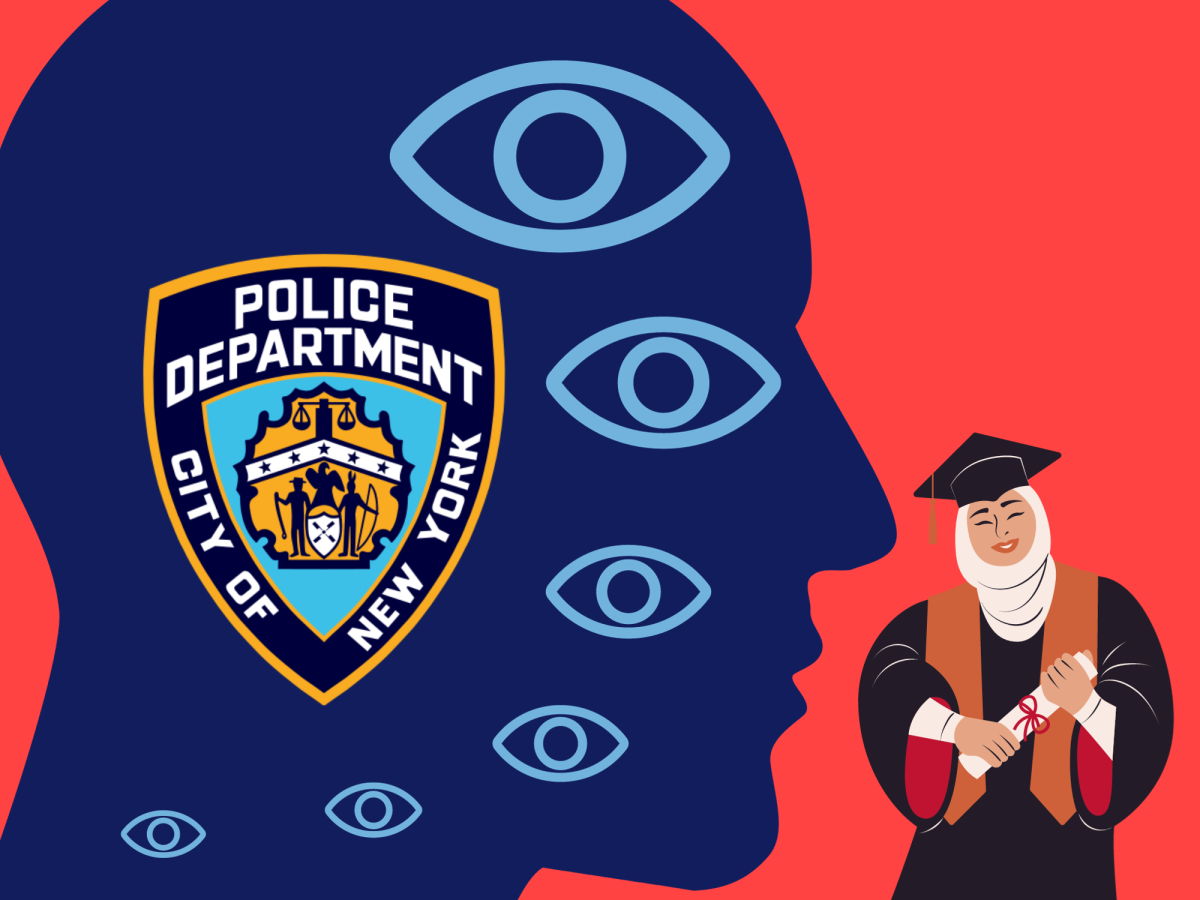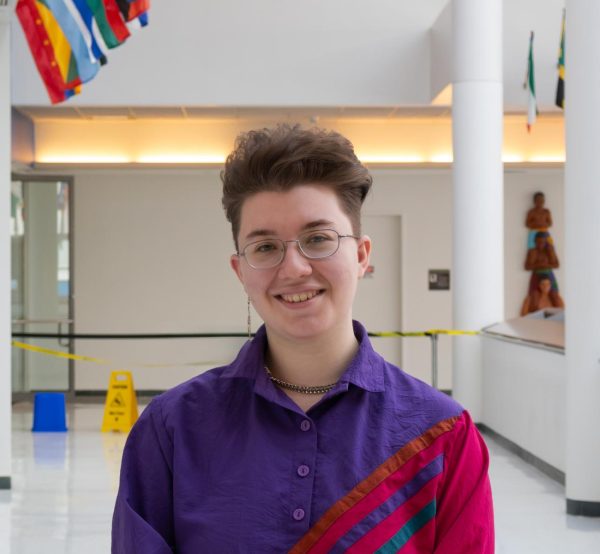In the wake of the Sept. 11 attacks, Muslim, Arab and South Asian New Yorkers were villainized and colleges were not a place of respite. The New York Police Department contributed to years of undercover surveillance of Muslim students happening on CUNY campuses.
CUNY has a responsibility to prevent religious discrimination, so officials must apologize for this failure to protect students. Additionally, it must also commit to ending this legacy of surveillance, as the surveillance has led to a chilling effect on the First Amendment rights of students.
This includes Palestinian students protesting for a ceasefire in the ongoing Israel-Hamas conflict, which has put students in the tragic position of fearing for the lives of their families abroad and for their own safety from antisemitic and Islamophobic hate crimes.
Moreover, the overseas conflict has resulted in Israel collectively punishing Palestinians in Gaza and the West Bank, who have faced decades of forced displacement and what the United Nations calls occupation that is, “illegal and indistinguishable from a “settler-colonial” situation.”
Following the Oct. 7 Hamas attacks, Israel has been directly contributing to a Palestinian genocide.
NYPD’s surveillance of Muslim students at CUNY was extensive according to a 2013 report whose co-authors included the Creating Law Enforcement Accountability & Responsibility project at the CUNY School of Law.
NYPD’s Intelligence Division identified 31 Muslim Student Associations in New York City universities. It designated seven as “of concern,” six of which are CUNY campuses: Baruch College, Hunter College, LaGuardia Community College, City College, Brooklyn College, St. John’s University and Queens College.
Muslim groups throughout these seven schools were targeted based on nothing of substance. Reasons included were “organizing militant paintball trips” or being “politically active.”
Officers monitored the digital presence of Muslim students on the daily.
Undercover police officers and informants spied on MSAs. An undercover officer accompanied 18 Muslim students from the City College of New York on an upstate whitewater rafting trip in 2008, the Associated Press reported.
Another undercover officer pretended to be a convert to Islam at Brooklyn College between 2011 and 2015 — a period during which she went to Islamic education classes, social gatherings, museum, aquarium trips and bridal showers with students, reported Gothamist. A short documentary that interviewed the students premiered in 2017.
The NYPD said that, “There’s truth in the Gothamist story,” but denied what they called, “this narrative that there was this overarching blanket surveillance” to the publication.
In an exclusive interview with The Ticker, Asad Dandia, a Muslim New Yorker who was spied on by a police informant, commented on their experience.
“Safe to say, every CUNY campus was surveilled,” Dandia said
He was surveilled after co-founding the nonprofit Muslims Giving Back in 2012 when he was 18. Dandia welcomed Shamiur Rahman’s participation, inviting him to his home and events at the John Jay College of Criminal Justice.
Rahman confessed on Facebook that the NYPD had recruited him as an informant. An Associated Press interview with Rahman, who denounced the NYPD’s surveillance as unconstitutional, revealed that he had been compensated with up to $1000 a month and leniency towards his minor marijuana arrests.
Dandia previously told NHK-World Japan that while Rahman’s actions were unjustifiable, he saw the NYPD as the instigator for giving him a manipulative ultimatum: to spy on his community or face up to 15 years in prison for drug possession.
The NYPD’s surveillance of Muslim New Yorkers — both inside and outside CUNY — was as violating as it was utterly pointless.
Its Demographics Unit, “the heart of a police spying program, built with help from the CIA,” never generated a single lead or triggered a terrorism investigation, the Associated Press reported.
“The instances where they [the NYPD] did quote, unquote, catch, somebody” Dandia said, were “usually an entrapment case of a mentally ill person.” Dandia clarified that he was referring to Shahawar Matin Siraj and Justin Kaliebe.
An extensive 2021 New York Times investigative report portrayed Siraj as manipulated by F.B.I. agents into a 30-year sentence on account of his intellectual disability, devastating his family. The New Yorker detailed Kaliebe’s years of mental health issues.
Dandia, initially very nervous at the idea, put aside his fear to become a plaintiff in a lawsuit, “Raza v. City of New York,” where Muslim New Yorkers sued the NYPD.
That change of heart came in “recognizing that this is going to be something very, very big, much bigger than myself,” he said. “This could have major policy changes for the city and perhaps even the entire country.”
The Raza lawsuit was filed by CUNY Clear, the American Civil Liberties Union and the New York Civil Liberties Union in 2013, in the aftermath of Associated Press journalists winning the Pulitzer Prize for revealing the full extent of the NYPD’s surveillance.
“To be honest, a lot of people knew, they just needed confirmation,” said Dandia.
The settlement was revised in favor of the plaintiffs in 2017. It included prohibiting race, religion, or ethnicity to be a substantial or motivating factor in NYPD investigations and limiting their duration by subjecting them to review by an appointed Civilian Representative.
The current Civilian Representative is Muhammad Faridi, the first Muslim-American in the role.
Dandia commented on Faridi saying, “He understands what we’ve gone through.”
However, the city still found a way to avoid accountability — it did not legally admit to any wrongdoing according to The Atlantic.
“Neither the NYPD nor CUNY has ever apologized,” Dandia said.
The CUNY general counsel claimed in 2015 that the school had no knowledge of the NYPD’s undercover surveillance, according to Politico.
It also claimed it had no information on whether the NYPD had violated the Handschu agreement, which regulates its powers related to political activity.
The council did not mention the non-legally binding Memorandum of Understanding the NYPD has had with CUNY since 1992 that prevents it from coming on campus without permission in non-emergency situations.
CUNY’s media team did not respond to a request for comment.
Silence by CUNY officials can only cast into doubt CUNY’s ability and desire to protect not just the freedom of expression but also basic wellbeing of students on campus.
A clear commitment to student safety is more necessary than ever in the aftermath of what Brooklyn College Professor Mustafa Bayoumi described in The Guardian as “a phalanx of police officers and a pro-Israel city councilwoman who came brandishing her own weapon,” at a protest by Brooklyn College students for Palestinian rights.
The councilwoman, Republican Inna Vernikov, who is currently in court over a resulting illegal gun charge, is Dandia’s representative. He said he was “pleasantly surprised” when she faced legal consequences.
“I see political officials holding college students more accountable than elected officials and powerful people,” Dandia said.
But Dandia’s pessimism was not unwarranted. Charges against Vernikov have been dropped after the NYPD examined the gun—weeks after she voluntarily turned it in a day after the protest—and said they found it inoperable.
Her lawyer, “did not respond to questions about whether the gun was already inoperable at the time of the rally, or whether someone removed it afterwards” to The City. The dropped charges do not mean that students protestors were not endangered—or did not have reasonable grounds to believe so.
Additionally, Dandia cited the CUNY administration’s non-response to a doxing truck at CUNY Law as an example of a lack of concern for students.
Columbia University recently established a resource group for its students impacted by the trucks.
However, it has also gone further than CUNY in limiting freedom of speech on campus by altering its protest policy. The changes were made without consulting students or faculty before suspending its chapters of Students for Justice in Palestine and Jewish Voice for Peace, a decision that hundreds condemned in an open letter.
Dandia said that to improve student safety, CUNY should meet directly with students and negotiate with them if they cannot agree instead of “operating in a silo from them.”
He said, “These are good students, their hearts are in the right place.” Dandia added, “You have to protect them.”
According to Dandia, one reason CUNY students would be feeling unsafe right now is because “Anti-Muslim, Islamophobic, post-911 vitriol is reemerging.”
“And so I would invite people, especially people who are non-Muslim or non-Arab to really familiarize themselves with what it was like for our communities at that time and… to recognize that we’re hurting and that we’re going to need all hands on deck to address the crisis to come,” he said.
CUNY’s administration can take this message to heart by apologizing for the trauma caused to Muslim students by the years of undercover NYPD surveillance on its campuses.







